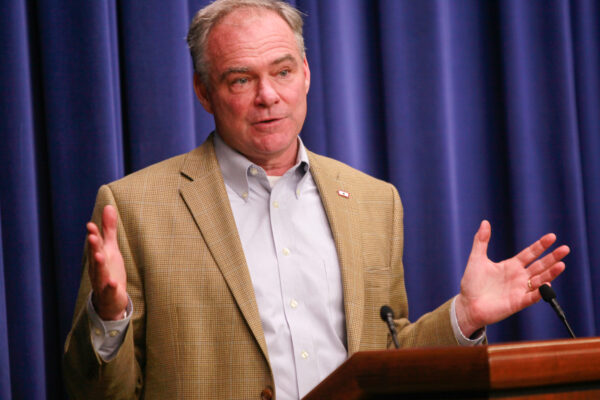Tim Kaine’s faith story is an essential part of his stump speech. At the vice presidential debate, the Democratic candidate mentioned his missionary year in his response to the first question, then had the chance to expand upon his story in the next-to-last question. He spoke of his family, his Jesuit high school education and his year working at a Jesuit mission in Honduras. Kaine is in public service because of his faith, yet he explained that he chooses not to legislate his personal beliefs.
As the New York Times notes, the VP candidates bring religion and morality into an election season in which they are largely absent. At the debate, both Kaine and Republican Mike Pence presented simplified stories of faith and politics. Over the past few weeks, I’ve had the chance to delve into the details of Kaine’s faith life for a story I wrote for Religion & Politics. Kaine’s story and the response to it seems to reflect trends in American religion today. I’ve seen several of the major themes emerging from our research on religious creativity and innovation come out in this election.
Experience over Ideology
Both journalists and voters sometimes seem perplexed when Kaine insists that his career in public service is spiritually motivated and grounded in his Catholic faith, at the same time that he has voted in favor of abortion rights and presided over 11 executions. Pence pushed him on the abortion issue in particular during the debate. On a Reddit thread, I even found an atheist calling him a hypocrite, arguing that he should fight for what he believes if he truly believes it.
Some explain Kaine’s position on life issues as separating the personal and political, as many Catholic Democrats have done to justify their allegiance to the party line on abortion. Yet, a deeper look at his story shows that this isn’t exactly right. As John Carr of Georgetown University’s Initiative on Catholic Social Thought and Public Life told me, “His commitment comes from faith and experience, not simply from influence and ideology.”
Carr was specifically referring to Democratic Party ideology in this case, but it also applies to Catholic ideology. Kaine’s position on life issues is not about pushing aside personal values but about a struggle between two seemingly competing personal values. To quote my own R&P piece:
And the same experience that taught Kaine to value faith and service led to his seemingly contradictory stances on how to live out his faith in the public square. In Honduras, he told C-SPAN, “I saw what it was like to live in a society where the rulers did whatever they wanted regardless of the law.”
So when his opponent in the 2005 race for governor ran ads attacking Kaine’s opposition to the death penalty, Kaine promised to uphold the law. The death penalty, he told David Gregory this year, is “emblematic of the kind of thing you’ve gotta struggle with in life. I would describe it as a clash between two important principles”—the sanctity of life and the rule of law.
Colleagues have told The New York Times that Kaine grappled over every death-penalty appeal for clemency as governor and would appear pained all day. He still struggles with those decisions. He told the National Catholic Reporter in August, “I hope on Judgment Day that there’s both understanding and mercy.”
A reoccurring theme in CRCC’s research is the importance of individual experience in forming a person’s understanding and beliefs about the world and spirituality. This also fits with what Kaine likely learned in Honduras about Liberation Theology, which looks at scripture and church teachings from the perspective of the lived experience of the poor.
Interestingly, Pence’s religious story also speaks to the primacy of spiritual experience. As I wrote for R&P, both veep candidates found Catholicism lacking in spirit:
While Pence became evangelical to find a personal relationship with Christ, Kaine found God in the kind of jovial communal Catholic worship he experienced in Honduras. “Mass was 2.5 hours long, and it was so vibrant and chaotic and fun,” he told C-SPAN.
Interestingly, Pence did not mention his Catholic background during the debate. His move away from Catholicism is not uncommon–13 percent of adults raised Catholic consider themselves to be evangelicals–and it concerns many Catholics. The “New Evangelization” movement in the Catholic Church hopes to inject the sense of spirit that Pence and Kaine both desired. Had Pence grown up Catholic today, he might have gotten involved in any number of “evangelical Catholic” youth programs where Catholics too are able to develop a “personal relationship” with Jesus Christ while singing catchy pop tunes made popular at World Youth Day celebrations.
These enthusiastic young Catholics, however, remain a minority. The Catholic Church is losing young people faster than any other denomination in the U.S. and most of them go to no religion. As a Vatican II Catholic, Kaine can be seen as representing a transitional generation. He still expresses consternation about putting the rule of law above the sanctity of life, and he says that in the end, he “accepts” church teachings even if he disagrees with them. The next generation does not care about church teachings as much—one’s personal experience supplants the teachings of the institution without (or perhaps with less) guilt.
“It’s all Good” Nones
Many thought that Clinton’s pick of Kaine was unwise, disillusioning those young and largely non-religious voters who rallied behind Bernie Sanders. Perhaps, though, Clinton has been listening to CRCC’s Richard Flory.
First, there’s the somewhat obvious argument that young “nones” aren’t as likely as the Democratic religious base or even religious moderates to show up at the polls on November 8, as Religion News Service reports. As I wrote at R&P, Kaine’s unique story puts him in a strong position to rally Black Church voters and Latino Evangelicals, as well as Catholics.
But when I was looking for responses from religiously unaffiliated Americans, I was surprised to find a defense of Kaine’s religious life.
On a Reddit atheism thread, one user described a Kaine speech as “religious pandering at its most sickening,” asking if others were “nauseated” by it too.
Others came to Kaine’s defense. “This is the sort of religious person I can respect,” another user responded. “If he’s proud of his Catholicism, then good on him.”
That line almost perfectly echoes what Flory calls his “It’s all good” theory. In CRCC’s research, we’ve seen movements away from the more militant atheism of Richard Dawkins, et al., toward more positive humanist movements. Most people without religious affiliation don’t care what their neighbors believe or don’t believe, as long as it doesn’t hurt anyone. As the Reddit commenter said: “I don’t believe in god, but I’m fine with people who do as long as they don’t expect me to live by their religion’s code.”
When the faith question came up during the debate, I saw this same range in responses. Here are just a few examples:
https://twitter.com/ChrisBerghoff/status/783493651292889088
.@timkaine nails it: "I don't believe that the doctrines of any one religion should be mandated for everyone." #VPDebate #secularvalues
— Secular Coalition for America (@seculardotorg) October 5, 2016
Solid answer from @timkaine on struggle to reconcile religion & public life. Very authentic. #VPDebate
— Shannon Coulter (@shannoncoulter) October 5, 2016
One reason people find Donald Trump appealing despite his many gaffs is that he seems “authentic,” a value in this age where individual experience rules. It’s something that Clinton has struggled with over the years, in her desire to protect her privacy. Kaine had his gaffs at the debate and has been criticized for interrupting his opponent. This election season, policy points may matter less than whether Kaine can convince voters that he and his running mate are the most authentic candidates, religion and all.
Megan Sweas is the editor and director of communications with the USC Center for Religion and Civic Culture.






